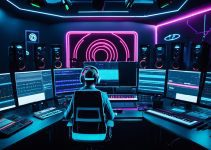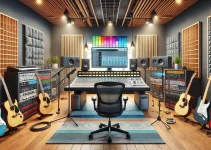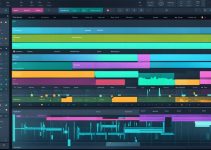The world of music creation is changing fast, thanks to Artificial Intelligence (AI) music generators. Ever thought, Can AI really make music as good as what humans create? This guide will dive into the exciting world of AI in music making. We’ll look at the tools, techniques, and trends changing how we make music.
Key Takeaways
- Discover how generative AI is changing the music industry with text-to-music AI generators.
- Learn about the tech behind AI music, like Recurrent Neural Networks and Generative Adversarial Networks.
- See how AI music generators offer benefits like saving money, making music your own way, and creating unique tunes fast.
- Find out about the best AI music platforms and how to use them to make your own AI songs.
- Understand AI’s effect on the music world and the exciting future it brings for both pros and new musicians.
Introduction to AI Music Generation
A new era has begun in music creation – the rise of generative AI music. This technology uses artificial intelligence to change how we make and enjoy music. It uses advanced algorithms and machine learning to open new doors for musicians of all levels.
What is Generative AI for Music?
Generative AI for music creates new, original tunes. It looks at old music to make new melodies, harmonies, and rhythms. This AI-composed music covers many styles, from classical to electronic, for everyone’s taste.
How AI Music Generation Works
At the core of AI music composition are complex algorithms that mimic human musicians. These algorithms study lots of music to find patterns and emotions. Then, they use this info to make new, unique songs. Techniques like deep learning and neural networks help the AI get better over time.
Benefits of Using AI Music Generators
- Rapidly generate new musical ideas and compositions
- Explore a wide range of musical styles and genres
- Personalize and tailor music to specific needs or preferences
- Save time and resources during the music production process
- Supplement and enhance human creativity, rather than replace it
AI music generators don’t replace human creativity. They’re a powerful tool for musicians. They open new ways to make music, make work easier, and help create amazing songs.
“AI music generators are not here to replace human creativity, but rather to empower and augment it. They offer a new realm of possibilities, allowing us to explore and experiment with music in ways we’ve never imagined before.”
Top AI Music Generation Platforms
In the world of music creation, AI-powered platforms have changed the game. They let users make unique, customizable tracks easily. Soundraw, Musicfy.lol, and Mubert are leading the way with their special features for music lovers and pros.
Soundraw
Soundraw is a tool that uses AI to make music. It’s great for creating an endless number of songs. Users can customize their tracks and get real-time feedback to make them just right. It costs $16.99 a year or $19.99 a month, making it affordable for both hobbyists and pros.
Musicfy.lol
Musicfy.lol takes music making to the next level. It lets you copy famous artists’ voices and turn text into songs. With features like AI voice cloning and text-to-music conversion, it’s perfect for all music creators. Prices start at $9 a month for the Starter plan, go up to $25 for the Professional plan, and reach $70 for the Studio plan.
Mubert
Mubert uses AI to create unique, royalty-free music for things like videos, podcasts, and apps. It has tools for collaboration, an API for developers, and a way to find new tunes. This platform gives you everything you need to make AI music.
These AI music composition platforms offer different ways to make AI music. They suit various needs and skill levels. Whether you’re a pro or just starting, these platforms let you explore the exciting world of AI music creation.
How to Make AI Music
Making AI music is easier than you might think. It involves three main steps: picking the right AI music generator, creating your first AI track, and editing the output. This way, you can get the music you want.
Selecting the Right AI Music Generator
When picking an AI music generator, look at the quality, customization options, and music rights. Loudly’s AI Music Generator is easy to use and lets you make royalty-free music in many genres and moods.
Generating Your First AI-Composed Track
To make a track, just set the genre, mood, and tempo. The AI will create a unique song. This quick process lets you try out many musical ideas fast. You can then pick the best one for your project.
Editing and Refining the AI-Generated Music
After making music, you can edit it to get the sound you want. This lets music producers, artists, and hobbyists quickly create and improve their music. They can mix human creativity with AI’s power.
| Platform | Free Tier Offerings |
|---|---|
| Suno | 50 daily credits, typically enough for 10 generations of music |
| Soundful | 10 song downloads per month in the free version |
| AIVA | 3 downloads per month in the free subscription |
| Soundraw | Unlimited track generation for free, but requires an upgrade for downloading the songs |
| Boomy | 3 releases per month in the free-tier, with each release containing up to 12 songs |
| Beatoven | Unlimited song creation for free users, but no song downloads unless users opt for subscriptions |
| Loudly | 25 song generations per month, each limited to 30 seconds, and one download per month in the free subscription |
Remember, AI music generators are handy but have limits and copyright issues. Finding the right mix of AI and creativity can open new doors in music production.
AI Music Generators for Professionals
AI music generators are not just for beginners. They also help professional music producers a lot. These tools offer advanced features and capabilities. They change how music is made with text-to-music software, AI MIDI generators, and AI voice generators.
Text-to-Music Software
Tools like AudioCipher and Suno AI let users make songs by typing lyrics or a description. These AI tools create original music that matches the input. This makes it easy for pros to try new ideas.
AI MIDI Generators
HookPad Aria and Lemonaide create new musical ideas in MIDI format. These can be edited in a digital audio workstation. They help music producers work faster and find new inspiration for their music.
AI Voice Generators
AI voice generators are also changing professional music. They make synthetic vocals and copy famous artists’ voices. This opens up new ways to experiment with AI in music.
These ai music generators for professionals include text-to-music software, ai midi generators, and ai voice generators. They’re changing music creation. They help pros work better and explore new ideas.
| AI Music Generator | Pricing Details |
|---|---|
| Soundraw.io | Offers a free AI music generator with Creator Plan at $16.99 per month and Artist Plan at $29.99 per month |
| AIVA | Free AI music generator for perpetual use, with Content Creators plan at €11 per month and Content Creators wanting to Copyright their content plan at €33 per month |
| Ecrett Music | Free for trial, with an Individual plan at $4.99 and Business plan at $14.99 |
| Amadeus Code | Offers a 14-day free trial and Premium plan for $9.99 |
| Beatoven.ai | Provides a free trial and subscription plans starting at ₹299 per month for 15 minutes of music generation, up to ₹999 per month for 60 minutes, also offering a buy minute option at ₹150 each |
| Suno.ai | Offers a Free Plan with limited credits, a Pro Subscription with undisclosed pricing, and a Premier Subscription with advanced features including streaming capabilities |
These ai music generators for professionals are changing the music industry. They offer cutting-edge tools for text-to-music software, ai midi generators, and ai voice generators. They help pros work better and explore new ideas.
Emerging Trends in AI Music Creation
AI is changing how we make music. New trends in AI music are set to change the industry a lot. Things like advanced text-to-music algorithms and AI-powered voice cloning are making music creation exciting.
AI music tools are getting easier to use and cheaper. About 20.3% of artists now use AI in their work. The market for AI music is growing fast, expected to hit $3.1 billion by 2028.
These AI tools are helping artists of all levels create music. They make it easier to make music without needing a lot of skills or expensive gear. This means more people can make music, making the process more open to new artists.
AI-powered voice cloning and synthesis are also big trends. They let artists create unique sounds and harmonies. As AI in music grows, its impact on the future is clear.
“Generative AI models can quickly generate musical elements such as drum beats or chord progressions, saving artists valuable time during the creative process.”
But, using AI in music also worries some about losing human jobs. There’s a debate about the role of AI in music. Some worry it could replace human creativity.
Still, many artists see AI as a chance to try new things and work more efficiently. As AI gets better, it could change how we make, produce, and listen to music. This could be good or bad.
Ethical Considerations and Copyright Issues
As AI music generation grows, we must look at the ethical and legal sides. A big worry is AI music might break copyright laws. AI models learn from big datasets that could include copyrighted music, making questions about who owns the new music.
To use AI music right, platforms like Soundful have strong rules to protect rights. Soundful doesn’t train models on copyrighted music. Instead, they use their own data or licensed ones. This way, creators keep their music rights and can make money from it.
There are also worries about AI’s ethics. Companies like OpenAI’s Jukedeck and AIVA show AI can make music that sounds like it was made by humans. This makes us think about AI’s role in music and if it could replace human jobs.
Music producers and creators need to be careful with legal and creative issues. Using AI music right, respecting rights, and being open about how music is made is key. This helps keep the music industry honest and true.
| Company | Ethical Approach | Legal Implications |
|---|---|---|
| Soundful |
|
|
| OpenAI’s Jukedeck |
|
|
| AIVA |
|
|
The music world is changing with AI, and we must focus on ethics and laws. By doing this, we can make sure AI music is good for everyone. It will respect rights, boost creativity, and keep the music industry honest.
“The responsible use of AI in music creation is essential to maintaining the integrity of the industry and empowering a diverse array of creative voices.”
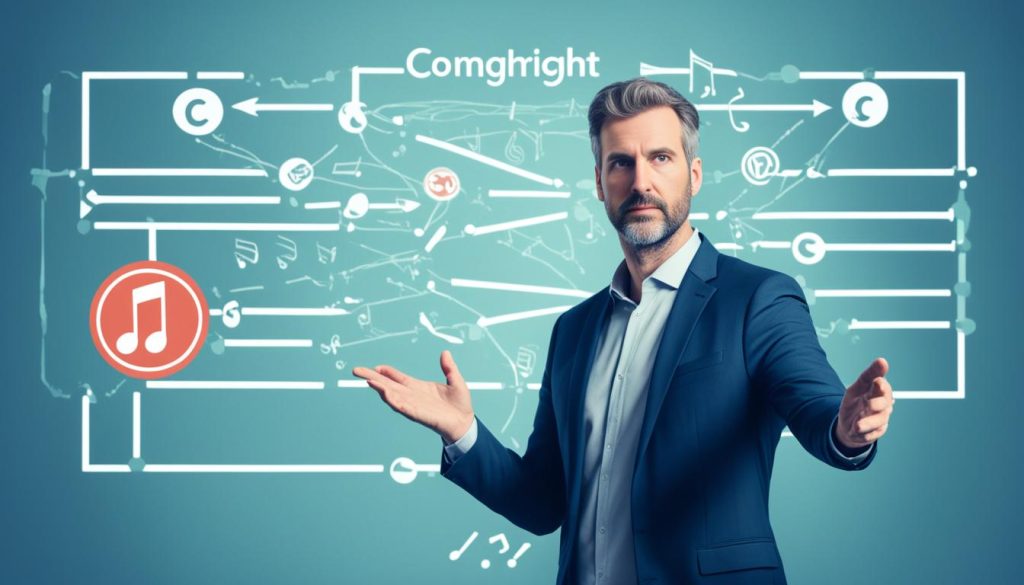
How to Make AI Music for Beginners
Starting with AI-generated music doesn’t have to be hard for beginners. Thanks to user-friendly AI music generators, new musicians can easily explore this exciting technology. These tools make it simple to begin your creative journey.
User-Friendly AI Music Generators
Platforms like Soundraw, Boomy, and Soundful have easy-to-use interfaces. They make it easy for anyone to create unique music. These tools let you customize your music, get feedback in real-time, and fine-tune the results to fit your taste.
Starting with these tools, you can see how AI can help in music creation. You’ll get to play with different features and learn how to shape the music you want.
Getting Started with AI Music Creation
To start making AI music, check out the easy-to-use AI music generators. Try out different features and settings to see how you can make the music your own. As you get more comfortable, you can refine your skills and try more complex techniques.
Remember, the main thing is to begin with tools that are easy to use. This way, you can fully explore the creative potential of AI in music. With patience and practice, you’ll soon feel at ease with making and tweaking AI music.
The secret to doing well in AI music for beginners is to start with easy tools. By using AI, you can open up a world of musical possibilities. This lets you bring your musical ideas to life.
AI Music in the Music Industry
AI technology is changing the music industry in big ways. AI-powered music generators let musicians try out new styles and genres easily. They can also make high-quality music faster. This change is making music creation different and giving artists new ways to shine.
Impact of AI on Music Composition
AI uses old music to learn and make new songs. These songs can sound like the music we know and love. Tools like OpenAI’s MuseNet, Boomy, AIVA, and Amper Music are leading this change. They help musicians make music fast and tailored to what people like.
AI Music and the Future of the Music Industry
AI music generation technology is set to change the music industry a lot. It will make making music faster and more personal. AI can make music from scratch, create emotional soundtracks, and even synthesize vocals. The future of AI music in the industry is exciting and will likely change how we see music.
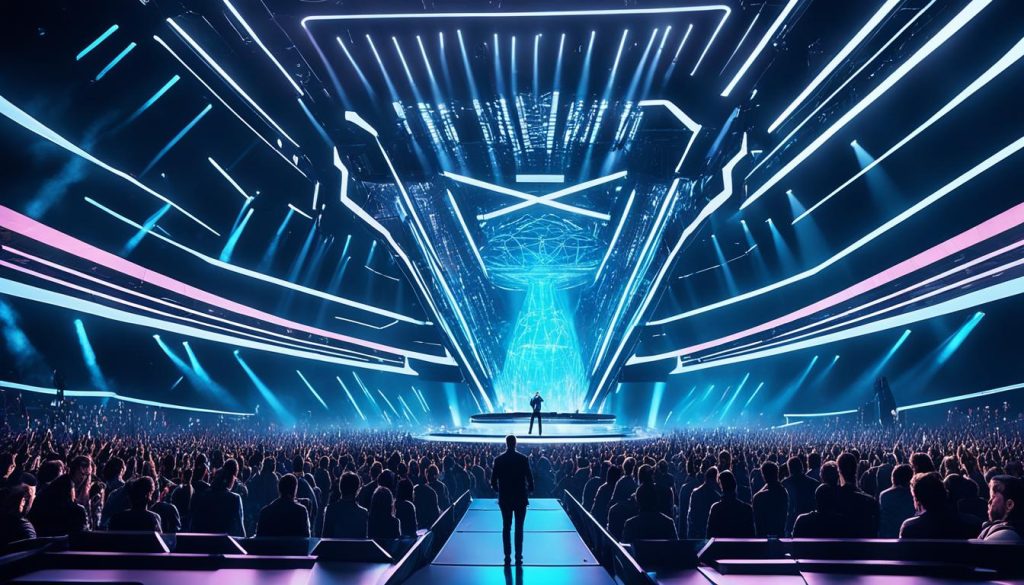
“AI is revolutionizing the music industry by empowering artists to explore new creative frontiers and redefine the boundaries of musical composition.”
Best Practices for Using AI Music Generators
The music world is changing fast, and AI music generators are becoming key tools for creators. To use these tools right, we need to follow some best practices. Let’s look at guidelines to get the best from AI music generators and keep your creative process strong.
Avoid Copyrighted Material
When picking an AI music generator, make sure it doesn’t use copyrighted music for training. This keeps you out of legal trouble with the music you make. Choose generators that use a wide range of, ethically-sourced data to make music that’s new and original.
Embrace Customization
Find AI music generators that give you the files you need, like track stems and MIDI data. This lets you tweak the AI’s music to fit your style. It makes sure the music shows off your creative vision.
Maintain a Balance
AI music generators are powerful, but don’t forget to keep your own creativity in the mix. Don’t just use AI music all the time. It’s still growing and can’t match the depth of music made by humans. Use AI to spark new ideas and improve your work, not to replace your creativity.
By following these tips, you can use AI music generators well. This keeps your music true to you and makes making music rewarding.
Conclusion
AI music generation has changed the music world, bringing new chances and challenges. It offers tools for both beginners and experts. This technology is growing, giving musicians powerful ways to improve their work.
It’s important for users to think about ethics and laws as they use AI. This tech can change how we make, produce, and listen to music. By understanding and using AI wisely, musicians can shape the music industry’s future.
The effect of AI on music will keep growing. Those who welcome this change will lead the creative revolution.
This guide shows us that the future of making music is about combining human skill with AI tools. AI music generators bring efficiency, versatility, and new creative ways. They open doors for artists, offer unique experiences, and make the music industry more varied and exciting.
This journey ends with a call to explore AI music creation’s endless possibilities. Join in and help shape the music industry of tomorrow.
FAQ
What is Generative AI for Music?
How does AI Music Generation Work?
What are the Benefits of Using AI Music Generators?
What are Some Top AI Music Generation Platforms?
How Do I Select the Right AI Music Generator?
How Do I Generate My First AI-Composed Track?
What Advanced AI Music Tools Are Available for Professionals?
What are the Emerging Trends in AI Music Creation?
What are the Ethical and Legal Considerations for Using AI Music Generators?
How Can Beginners Get Started with Making AI Music?
How is AI Impacting the Music Industry?
What are the Best Practices for Using AI Music Generators?
Source Links
-
- How to Generate AI Music in 2024 (Tutorial) – https://www.elegantthemes.com/blog/business/how-to-generate-ai-music
- The Ultimate Guide to Making Electronic Music with AI – https://musicmadepro.com/blogs/news/the-ultimate-guide-to-making-electronic-music-with-ai
- AI Music: The Future of Music Production – https://www.audiocipher.com/post/ai-music-app
- How-To: Creating Music with AI Music Generators | Soundful – https://soundful.com/how-to-guide-creating-music-with-ai-music-generators/
- Basic Guide To AI Music Generators – – https://www.beatoven.ai/blog/basic-guide-to-ai-music-generators/
- Top 11 AI Music Generators in 2024 – https://www.analyticsvidhya.com/blog/2023/08/generative-ai-music-generators/
- 5+ Best AI Music Generators of 2024 (I Tested Them All) – https://medium.com/@artturi-jalli/ai-music-generators-98575bec0e4c
- 10 Best AI Music Generators (July 2024) – https://www.unite.ai/best-ai-music-generators/
- Tips and Tricks for Using AI Music Generators | Soundful – https://soundful.com/tips-and-tricks-for-soundfuls-ai-music-generator/
- 7 Free AI Music Generators to Create Unique Songs to Use In Your Projects – https://www.makeuseof.com/free-ai-music-generators-create-unique-songs/
- SOUNDRAW – https://soundraw.io/
- Suno – AI Music Generator – https://www.pgmusic.com/forums/ubbthreads.php?ubb=showflat&Number=803083
- The Influence of AI in the Music Industry: A Game Changer or a Passing Trend? – https://stewarttownsend.com/the-influence-of-ai-in-the-music-industry-a-game-changer-or-a-passing-trend/
- Transforming the Music Industry: AI in Song Composition and Production – https://medium.com/@jam.canda/transforming-the-music-industry-ai-in-song-composition-and-production-1c3b2e6c24c1
- Ethical Considerations on AI Music | Soundful – https://soundful.com/ethical-considerations-on-ai-music/
- Ethical Considerations in AI Music Creation – https://www.linkedin.com/pulse/ethical-considerations-ai-music-creation-dan-jones-p6ose
- How to make AI songs with music? – https://medium.com/@ecommerce_plan/how-to-make-ai-songs-music-f130a77ccfe6
- How to make an AI cover song with any artist’s voice – https://www.musicradar.com/how-to/ai-vocal-covers
- 5 Best AI Music Generators in 2024 (Compared) – https://www.elegantthemes.com/blog/business/best-ai-music-generators
- How to Make AI Music? | Speechify – https://speechify.com/blog/how-to-make-ai-music/
- AI for Music Production: 10 Tools to Produce Like a Pro – https://dittomusic.com/en/blog/ai-for-music-production-tools-for-musicians
- These AI Music Generators Are Mind-Blowing—And Make You Feel Like a Virtuoso – https://www.popularmechanics.com/technology/audio/a44109081/ai-music-generators-explained/
- How to make music with AI using Udio – https://www.tomsguide.com/ai/how-to-make-music-with-ai-using-udio
- The Impact of Artificial Intelligence on the Music Industry | Musicians Institute – https://www.mi.edu/in-the-know/ai-music-production-enhancing-human-creativity-replacing/
- How to make AI music for your content? – Mubert Blog – https://mubert.com/blog/how-to-make-ai-music-for-your-content
